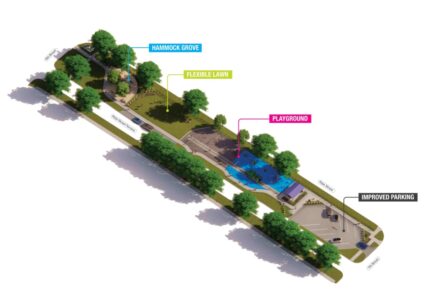Douglas County commissioners ease rules for home-based businesses, drop registration and fees for many small operations

photo by: Josie Heimsoth/Journal-World
Douglas County commissioners met on Wednesday, April 9, 2025.
Douglas County commissioners on Wednesday approved a slate of changes easing regulations for small home-based businesses, which will allow many to operate without registering with the county or paying an annual fee.
The changes apply to businesses run out of people’s homes in the unincorporated parts of the county, and they cover activities in a variety of fields. According to a memo in the commission’s meeting agenda, there are 115 registered home occupations of various types and sizes in the unincorporated areas, including in the fields of construction, home repair, landscaping and arts. Additionally, county staff was aware of at least 57 home occupations in the county that were either unregistered or unpermitted.
The County Commission had originally been scheduled to vote on the changes to the registration and fee requirements in January. However, it deferred action on them at that time because it wanted staff to explore how to make it more permissive for automobile, welding and upholstery businesses to be home occupations, as the Journal-World reported.
The new rules approved Wednesday make it easier for small automotive businesses to operate as home occupations. They allow for welding to take place when it’s a part of a permitted activity; auto upholstery was also removed from the list of prohibited activities.
The list of prohibited home occupations has also been renamed to ‘Uses Deemed Not to Be a Home Occupation.’ According to a memo in the agenda, this change allows the Zoning and Codes Director greater flexibility to evaluate small-scale businesses — such as auto repair or welding — individually, provided they meet all proposed standards.
Commissioner Erica Anderson thanked county staff on Wednesday for considering the commission’s feedback earlier in the year and making the changes.
“I see everything that I brought forward in what you actually presented,” Anderson said.
Some of the rules on whether a structure is a home-based business relate to the physical space the business uses. The business must operate entirely within the home or an “accessory structure” and can occupy no more than 25% of the home’s livable area or up to 400 square feet within the accessory structure. Additionally, only one on-site employee who doesn’t live in the home is allowed, and services can only be provided on the property by appointment.
Larger-scale home occupations — such as agricultural equipment repair or contractor material storage — would still need to register with the county. However, under the new rules, they’ll no longer face minimum acreage requirements or limits on how much of an accessory structure they can use, and their registration will now be required every two years instead of annually.
Another update since the January meeting states that the director of Zoning and Codes can set conditions for larger-scale businesses, such as restricting hours, location, or certain activities, when necessary to minimize off-site impacts or safeguard public health, safety, and welfare.
In other business, county commissioners:
• Heard a department overview of the Douglas County Planning and Zoning & Codes Departments. County departments are providing an overview of their operations and services to the county commissioners during work sessions during the early part of the year. No action followed the session, which was intended for informational purposes only.
• Accepted Kansas Department of Transportation funding with the maximum amount of $1.4 million for a project to replace a bridge on North 1800 Road, also known as the Farmer’s Turnpike. The route provides heavy truck access from I-70 to the industrial park on Lakeview Road, and the bridge has been showing increased signs of concrete deterioration. The project is planned for construction in 2026, according to a memo in the agenda.
• Held an executive session for the purpose of consulting with the county counselor.






